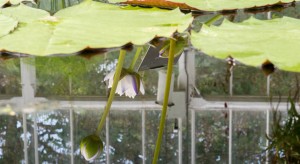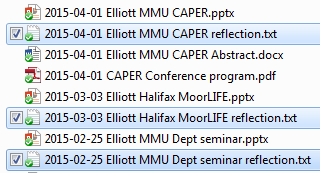Organised reflection
 Keeping a reflective record of teaching activities can help improve practice over time (e.g. Finlay 2008). I previously found this to be of marginal value partly because I have rarely gone back to read my old reflections. One reason for this is not knowing how and where to store the notes, and not remembering how I did it last time. I wanted to make sure that the reflective process is useful, so I tried to establish an easy system to stick to.
Keeping a reflective record of teaching activities can help improve practice over time (e.g. Finlay 2008). I previously found this to be of marginal value partly because I have rarely gone back to read my old reflections. One reason for this is not knowing how and where to store the notes, and not remembering how I did it last time. I wanted to make sure that the reflective process is useful, so I tried to establish an easy system to stick to.
Here are some options which I tried and rejected:
- Notes inside powerpoint – sometimes powerpoint is not used. Not obvious whether notes were made or not.
- Electronic notebook inside lesson folder – Hard to find notes after a while. Not obvious whether notes were made or not.
- Electronic notebook stored centrally (e.g. OneNote, EverNote) – Link to original lesson easily lost. Not obvious whether notes were made or not.
- Paper notebook – Doesn’t make sense when everything else is digital. The book will be lost or forgotten.
I sent a questionnaire to 19 colleagues to find out what they do. There were 4 responses which I expect were a self-selecting group (Olsen 2008) relating to positive engagement with reflection.
Responses about note taking systems were broadly similar to my own experience, here are some extracts:
- Handwritten on printed documentation
- Files inside unit directory
- Evernote / phone
- Ipad
- Inside the brain
- Informally or irregularly
- Publishing on a blog
Two respondents said they read their notes before teaching the same again next year, the others did not mention returning to the notes despite being asked. Reflective practice can be useful without taking or returning to notes because the process itself enhances self awareness and will help commit experiences to memory (Osterman and Kottkamp 1993). Keeping well organised notes provides further opportunities to get the most out of reflective practice, and also to provide evidence if needed. My experience seems to not be unique, and I have found a solution that works for me.
The system
I eliminated most hierarchical folder structures and now name files according to a simple scheme:
yyyy-mm-dd Author Place Event
In most cases there is more than one file associated with each event, for example I might keep the abstract book for a conference along with my own contribution, and my personal reflection (see screenshot).

The important points are:
- Files are named by date in a way that the operating system will sort correctly. This means that all files relating to the same event are kept together.
- The operating system search functionality allows for finding files based on the name and content inside. This means reflections can be found based on remembrance of just a few key words.
Usually when I am preparing a new presentation, it is based at least in part on an older presentation. This system makes it very easy to find all older versions, and also locate any notes about it at the same time.
I have learned from this activity that most of my teaching colleagues probably do not keep reflective notes of their practice. The minority who keep such notes are generally like me well intentioned but not that well organised, and therefore we do not gain the full benefit of the reflective process. I devised a system to help me overcome this problem and after several months I am convinced that it is effective, so my action plan is to continue this scheme and extend it to other activities.
References
Finlay L (2008). Reflecting on ‘Reflective practice’. PBPL CETL 52.
Olsen R (2008). Self-selection bias in Lavrakas PJ (ed) Encyclopedia of survey research methods. Sage Publications, CA, pp. 809–811
Osterman KF and Kottkamp RB (1993). Reflective Practice for Educators: Improving Schooling Through Professional Development. Sage Publications, CA.
Resources
After establishing my system I searched the internet to see if anyone else was doing the same. The best example I found is at plaintext-productivity.net, and I have refined my system with some ideas from that site.
Questionnaire
These are the questions I asked to inform this article:
- Do you record written/typed reflection on your teaching? (if NO, do you reflect on your teaching at all? – No need to answer 2+3)
- Where do you keep your reflective notes? (if on computer then please mention what software or organisation is used)
- How often do you go back and read your old reflections?
Thanks to those who responded.